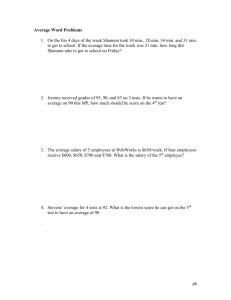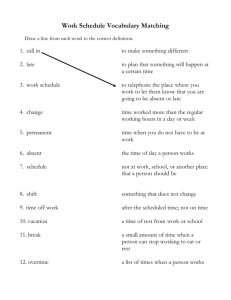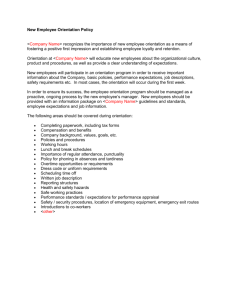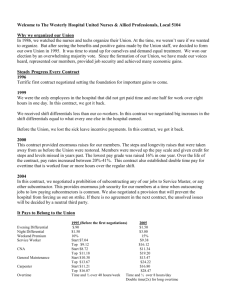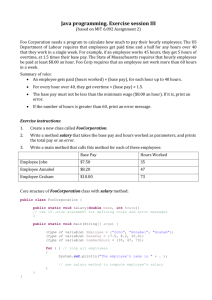A lawyer and her client weigh in on the overtime scam
advertisement
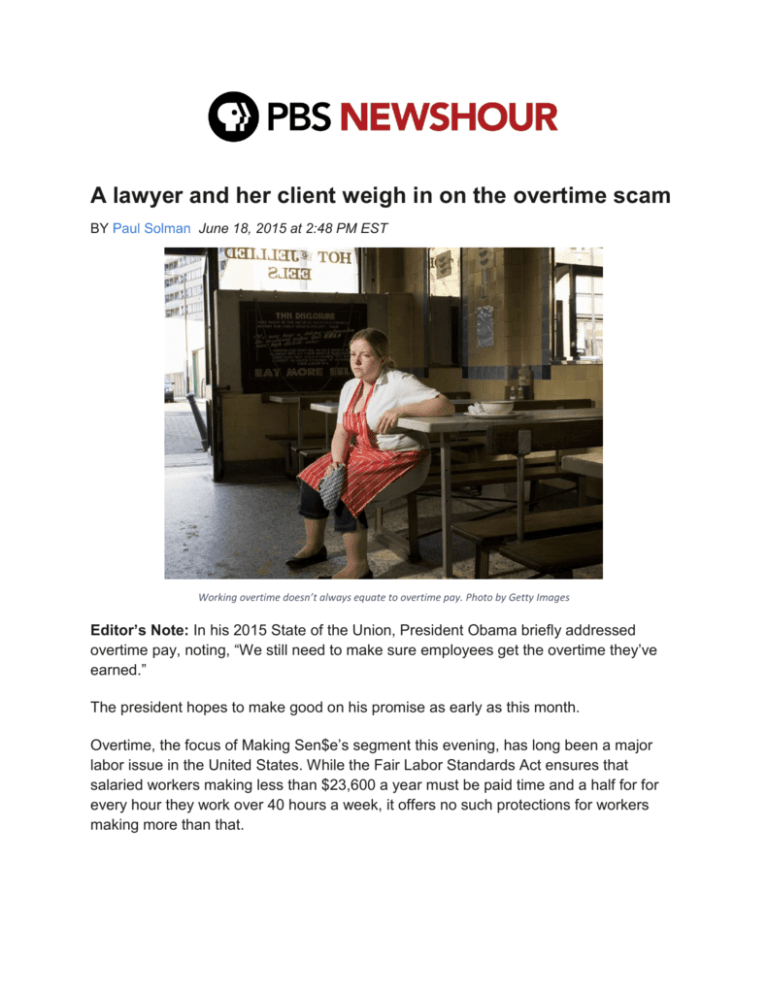
A lawyer and her client weigh in on the overtime scam BY Paul Solman June 18, 2015 at 2:48 PM EST Working overtime doesn’t always equate to overtime pay. Photo by Getty Images Editor’s Note: In his 2015 State of the Union, President Obama briefly addressed overtime pay, noting, “We still need to make sure employees get the overtime they’ve earned.” The president hopes to make good on his promise as early as this month. Overtime, the focus of Making Sen$e’s segment this evening, has long been a major labor issue in the United States. While the Fair Labor Standards Act ensures that salaried workers making less than $23,600 a year must be paid time and a half for for every hour they work over 40 hours a week, it offers no such protections for workers making more than that. Since 1975, when the threshold salary to receive overtime pay was established, it’s been increased only once, in 2004, but never adjusted for inflation. Had it been adjusted for inflation, that minimum salary would be about $50,000 today. Business leaders are wary of the proposed revamping. Many have argued that raising the threshold salary would force them to pay workers hourly wages in order to cut costs. Such changes, they say, could hurt job growth and those employees currently in salaried positions. Labor advocates, on the other hand, argue that salaried employees are being forced to work long hours for no extra pay. In their opinion, it’s time for the law to be revamped. Economics correspondent Paul Solman sat down to speak with Gassan Marzuq, a former Dunkin’ Donuts manager and his lawyer Shannon Liss-Riordan about overtime work. Riordan argues that Marzuq should have received overtime and has sued his former employer, which runs 50 Dunkin’ Donuts shops in Massachusetts. The text of Gassan Marzuq and Riordan’s conversation with Paul has been edited and condensed for clarity and length. Tune in tonight to hear more on the subject of overtime from business leaders and labor advocates. — Kristen Doerer, Making Sen$e Editor Paul Solman: Explain the case to us. What’s the case, and where is it? Shannon Liss-Riordan: Mr. Marzuq was a manager at a Dunkin’ Donuts, he was working extremely long hours, often 70 or more hours a week, and he was paid a little over $40,000. We brought a case that he should’ve been paid overtime. He was on salary, so they could work him as many hours as they wanted, and it was free labor, because anyone else they would have to pay more money to. Paul Solman: Gassan, how much were you making? Gassan Marzuq: I was making roughly $900 a week, about $20 an hour. With all the hours that I worked, it was roughly 75 hours on average, if not more. If you calculate that, I’m making less than the regular employees, who work there side by side with me. Paul Solman: You were working 75 hours, but you weren’t being paid for those hours? Gassan Marzuq: That’s correct, because I was salaried. If I worked 40 hours, or if I worked 100 hours, it’s the same pay. Paul Solman: How much were you making per hour? Gassan Marzuq: I was making $20 an hour. But that’s on a 40 hour work. But if I’m working 75 hours a week or 80 hours a week, I’m making only $9 or $10 an hour, which is less, even lower than what the regular employees are making. And you’ve got the title to be a manager, without authority. Paul Solman: Could they just tell you to keep working? Gassan Marzuq: Absolutely. Because they gave you the title, you are a manager. You are on salary, you have to cover all of those shifts and the holes that go through the day. Paul Solman: You mean, if somebody didn’t come in, then you would have to fill in for them? Gassan Marzuq: Absolutely. Because, say, somebody called in [and they can’t make their] early evening shift. Who are they going to call? They’re going to call the manager. Who is the manager going to call? The owner? Or the supervisors higher up than him? You try to call other employees, but the other employees are not interested, because they have a life to live, too. Paul Solman: And they’re only making $9 or $10 an hour. Gassan Marzuq: That’s correct. You’re going to go in and cover that person who called in. Paul Solman: So you’re coming in to do the shift of somebody who’s just serving, for example, at Dunkin’ Donuts. But since you’re called a ‘manager,’ you weren’t paid at all? Gassan Marzuq: That’s absolutely true. You’re serving customers, you’re pouring coffee, you’re cleaning. You’re doing a whole lot more than the other employees. And the title does not mean anything. The title is only a name, without any authorities. Paul Solman: Did you know that when you took the job? Gassan Marzuq: I did not know that. I mean, when you say manager, you think manager with authority. But when you sign contract, you find the reality is different than what the contract is, and all of the benefit goes to the franchisees not to the employees. They are taking advantage of that to cover the operation of the store. And that’s all it is. Paul Solman: Shannon, is this common practice in America? Shannon Liss-Riordan: This is common practice in America, the fast food restaurants in particular. Because they’re trying to keep their costs down, and because they put their managers on salary, they can work their managers as many hours as they want. And it saves them money from having to hire other employees or from paying overtime to the non-exempt employees. That’s why we’re trying to show in Gassan’s case, that most of what he was doing was not managerial work. He was pouring coffee, ringing up the register, cleaning up the bathroom, cleaning the parking lot, and for that, he should’ve been paid overtime for working 75 hours a week, missing out on his family life, giving everything he could to this employer and not getting paid appropriately for it. Paul Solman: This is a competitive industry, so are they just doing what the other fast food restaurants do? Shannon Liss-Riordan: Other fast food restaurants have been doing the same thing. They’ve been getting away with calling their managers, who are not making the kind of money that you think of when you hear of executive. Paul Solman: This isn’t CEO pay, right? Shannon Liss-Riordan: No, the federal law, the Fair Labor Standards Act has an exemption from overtime for bona fide executives. So these companies are claiming that Gassan was an executive. He wasn’t an executive. He was cleaning the bathroom, he was pouring coffee in the store. The way the law is right now, there’s a lot of confusion about who is qualified for this exemption from overtime, and it really doesn’t make a lot of sense that we lawyers have to spend so much time figuring that out, and fighting about that in the courts, when someone who’s making $42,000 a year and working 75 hours a week isn’t being paid overtime? Shannon Liss-Riordan: The new regulations that are being talked about and that we’re all hoping will be coming out soon, will revise the regulations to determine who is eligible for the executive exemption, under the federal overtime law. Right now, if you make less than $455 a week, you’re automatically entitled to overtime. If you make more than that, there’s this complicated legal fight about what your primary duty is, and there are all these multiple legal factors that you have to look at. What we, in the labor community, would like to see, is simplifying those rules. We’re hoping to see that number go up substantially to at least $1000 a week. $455 a week is about $23,000 a year. So under the current state of the law, you can be making $25,000 a year and a court might find you to be a ‘bona fide executive.’ That needs to change. Paul Solman: That is sort of amazing, actually. Shannon Liss-Riordan: It is. So managers of fast food restaurants, like Gassan here making about $42,000 a year, working extremely long hours—75 hours a week—are not getting paid anything extra for all of those long hours. Paul Solman: He wasn’t getting paid for any hour over 40? Shannon Liss-Riordan: Well, he was paid on a salary, so his employer only had to worry about paying him his $900 a week, and they could work him as many hours as they wanted to for that salary. Paul Solman: Let me ask a question to Gassan. Suppose you’d said ‘no, I’m only going to work 40 hours, I’m sorry, but you’re not paying me for that.’ Gassan Marzuq: I’d be terminated. Paul Solman: Really, that simple? Gassan Marzuq: Simple as that. Because, you are only a number. And you gonna fill in this number. If you don’t like it, you’ll leave. But, you are a family person, you have a wife, you have kids, you have a house to support, so what are you going to do? Quit and start from the bottom again? You’re going to swallow it, until you find something else. And it’s hard to find something here, especially for a person like me. I’m not educated person, I don’t have a degree. But I have the experience. Paul Solman: When did you start to realize that you were. When did you start to feel you were being taken advantage of? Gassan Marzuq: I felt that when my kids began to go to college. I said, my goodness to myself, my kids grew up so fast. I never had the time to enjoy my kids’ childhoods to be with them, to share their activities. I never went to their games, I always worked for Dunkin’ Donuts. I always got that phone call. They graduated from high school, and I did not enjoy that day. The majority of the employees are teenagers so they all graduated on the same day. Now, are you going to be with your son, or are you going to be at the store? You have two choices. You be with your son, the store it will close, and you will lose your job. Paul Solman: So on your son’s high school graduation day, you were working? Gassan Marzuq: At Dunkin’ Donuts store to cover shifts.

